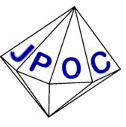|
|
|
Conférenciers invitésCette page est amenée à être complétée au fur et à mesure que les informations arrivent... Conférence invitée n°1Orateur : Günter SCHMIDT (MPI and Saarlands University, Allemagne) Date : 26 juin 2019, 14:15 Titre : Scheduling: from theory to practice Résumé : Scheduling problems may be understood as allocation of resourcesover timeto perform a set of tasksbeing parts of one or more processes. Tasks compete for limited resources and have characteristics like ready times, due dates, and urgency weights. Different criteria measuring the quality of the performance are taken into account. Scheduling problems arise in many applications; building the pyramids over 3000 years ago is an ancient example. We will discuss research directions, applications and special models. Téléchargement de la présentation
Conférence invitée n°2Orateur : Hans KELLERER (ISOR, University of Graz, Autriche) Titre : Approximation Algorithms for Scheduling Problems with Maximum Lateness Criteria Date : 27 juin 2019, 10:30 Résumé : This talk will be devoted to the presentation of old and new results related to scheduling problems with the objective of minimizing the maximum lateness. Most of the scheduling problems associated to this criterion are strongly NP-hard and motivate the design and analysis of approximation algorithms.The first part of the talk will be a tutorial on classic results for this problem. The second part is devoted to new results. In particular, we are interested in integrating non-availability machine/operator constraints. These constraints can be fixed and known in advance or can happen in a semionline scenario.
Conférence invitée n°3Orateur : Eduardo UCHOA (Universidade Federal Fluminense, Niteroy, Brésil) Titre : Recent Advances in Exact Algorithms for Vehicle Routing Date : 27 juin 2019, 13:30 Résumé : The Vehicle Routing Problem (VRP) is among the most widely studied problems in the fields of operations research and combinatorial optimization. Its relevance stems from its direct application in the real world systems that distribute goods and provide services, vital to the modern economies. Reflecting the large variety of conditions present in those systems, the VRP literature is spread into dozens of variants. For example, there are variants that consider time windows, multiple depots, mixed vehicle fleet, split deliveries, pickups and deliveries, precedences, etc. The currently best exact VRP algorithms are based on the combination of column generation and cut separation, in the so called Branch-Cut-and-Price (BCP) algorithms. This talk surveys significant recent contributions by several authors. In particular, it presents the concept of cuts with limited-memory (Pecin et al. 2014), a technique that represented a breakthrough on some of the most classical VRP variants, allowing the optimal solution of instances with up to a few hundreds points. The talk also presents the ongoing efforts for creating the first effective generic exact VRP algorithms. They should be suited to many distinct variants and still have a good performance. Conférence invitée n°4Orateur : Evripidis BAMPIS (LIP6, Université Paris 6) Titre : Over-time optimization: positive and negative results Date : 27 juin 2019, 16:15 Résumé : In this talk we focus on a multistage model that takes into account the evolution of the data over the time and we will present some positive and negative results for the multistage variants of some classic combinatorial optimization problems. Conférence invitée n°5Orateur : Antonios ANTONIADIS (Max Planck Institute, Allemagne) Titre : On the Traveling Salesperson Problem with Neighborhoods Date : 28 juin 2019, 10:30 Résumé : The Traveling Salesperson Problem (TSP) is commonly regarded as one of the most important problems in combinatorial optimization. In TSP, a salesperson wishes to find a tour that visits a set of clients in the shortest way possible.
This talk focuses around a very natural generalization of TSP, motivated by clients that are not static but willing to move in odrer to meet the salesperson: In the Traveling Salesperson Problem with Neighborhoods (TSPN) each client resides in a geometric region (in some space). The goal is to output a tour of minimum length that visits at least one point in each region. Even in the Euclidean plane, TSPN is known to be hard to approximate which gives rise to studying more tractable special cases of the problem.
We discuss the state of the art for several such more tractable cases of TSPN, in particular when the aforementioned regions are either hyperplanes or lines in a d-dimensional Euclidean space, and present related open problems.
|
| Personnes connectées : 3 | Vie privée |

|

